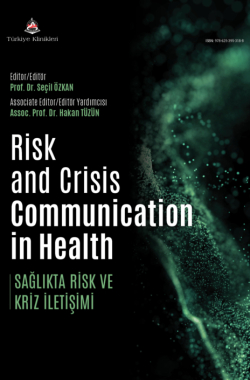Preparedness for Health Crises: Planning and Resilience
Gamze KETREZa , Hülya ŞİRİNb
aCommunity Health Center, Muş, Türkiye
bUniversity of Health Sciences Gülhane Faculty of Medicine, Department of Public Health, Ankara, Türkiye
Ketrez G, Şirin H. Preparedness for health crises: Planning and resilience. In: Özkan S, ed. Risk and Crisis Communication in Health. 1st ed. Ankara: Türkiye Klinikleri; 2024. p.11-6.
ABSTRACT
A crisis is an extraordinary situation that usually occurs suddenly and unexpectedly, affecting individuals, society and even the whole world, disrupting the normal functioning of institutions, threatening financial resources and the welfare of individuals. Situations such as natural disasters, epidemics, climate change, migration, terrorism are health crises that can occur globally. Crises have a very important place in health services that must continue uninterruptedly. Because they cause irreversible loss of life or illness or disability. Therefore, effective management of health crises is very important. For effective management, it is necessary to be prepared for all kinds of crises and to intervene effectively during the crisis. The planning and preparation phase is very important for an effective intervention in case of a crisis. Good crisis management is ensured by the cooperation and coordination of well-prepared, well-planned, well-organized, well-trained institutions, resilient societies and international organizations. More investment should be made in preparation and planning for future crises, prioritizing public health services. Thus, the damage caused by crises will be significantly prevented.
Keywords: Health crises; resilience; global collaboration
Kaynak Göster
Referanslar
- Ozanne LK, Ballantine PW, Mitchell T. Investigating the Methods and Effectiveness of Crisis Communication. Journal of Nonprofit & Public Sector Marketing. 2020;32:379-405. [Crossref]
- Güneş D, Güder M. Kriz Yönetimi. in Olağan Dışı Durumlarda Sağlık Yönetimi. Durmuş A, Amarat M, edtörler. İstanbul: Efe Akademi Yayıncılık; 2023. p.63-89.
- Canyon D. Definitions in crisis management and crisis leadership. CanSecurity Nexus. In: Daniel K, ed. InouyeAsia-Pacific Center for Security Studies; 2020. p.1-9.
- Burkle FM Jr. Challenges of Global Public Health Emergencies: Development of a Health-Crisis Management Framework. Tohoku J Exp Med. 2019;249:33-41. [Crossref] [PubMed]
- Doğan M. Crisis Management in International Organizations and Turkish Public Administration: The Case of Covid-19. Journal of Society, Economics and Management. 2021;2:1-21.
- OECD. Ready for the Next Crisis? Investing in Health System Resilience. (OECD Health Policy Studies, OECD Publishing, Paris, 2023).
- Altun F. Yüzyılın Sağlık Krizi Olarak Kovid-19'un Toplumsal Yaşama ve Kadınların Sosyo-Ekonomik Durumlarına Etkileri. Marmara Universitesi Kadin ve Toplumsal Cinsiyet Arastirmalari Dergisi. 2021;5:51-73. [Crossref]
- Kök H. Afetlerde Kriz Yönetimi ve Sosyal Hizmet Örgütleri. Sosyal Çalışma Dergisi. 2023;7:1-17.
- Dimian GC, Apostu SA, Vasilescu MD, Aceleanu MI, Jablonsky J. Vulnerability and resilience in health crises. Evidence from European countries. Technological and Economic Development of Economy. 2021;27:783-810. [Crossref]
- Özçelik E. Afetlerde Sosyal Hizmetler. Afet ve Risk Dergisi. 2020;3:46-55. [Crossref]
- WHO. Handbook for Developing a Public Health Emergency Operations Centre. Part A: Policy, Plans and Procedures; 2018.
- Haşit G. Kriz İletişimi ve Yönetimi. Eskişehir: Anadolu Üniversitesi Yayınları; 2013.
- Sands P, Mundaca-Shah C, Dzau VJ. The Neglected Dimension of Global Security-A Framework for Countering Infectious-Disease Crises. New England Journal of Medicine. 2016;374:1281-7. [Crossref] [PubMed]
- Gözlü K. Sağlık Hizmetlerinde Kriz Yönetimi. Din A, editör. Sağlık Bilimlerinde Multidisipliner Araştırmalar 3. İstanbul: Efe Akademi Yayınevi; 2020. p.69-91.
- Liu Y, Lee JM, Lee C. The challenges and opportunities of a global health crisis: the management and business implications of COVID-19 from an Asian perspective. Asian Business & Management. 2020;19:277-97. [Crossref]
- Commission & European. Communication from the Commission to the European Parliament and the Council: The EU Approach to Resilience: Learning From Food Security; 2012.
- World Health Organization. Regional Office for Europe. Strengthening Resilience: A Priority Shared by Health 2020 and the Sustainable Development Goals; 2017.
- Emami SG, Lorenzoni V, Turchetti G. Towards Resilient Healthcare Systems: A Framework for Crisis Management. Int J Environ Res Public Health. 2024;21:286. [Crossref] [PubMed] [PMC]
- Suleimany M, Mokhtarzadeh S, Sharifi A. Community resilience to pandemics: An assessment framework developed based on the review of COVID-19 literature. International Journal of Disaster Risk Reduction. 2022;80:103248. [Crossref] [PubMed] [PMC]
- Saja AMA, Teo M, Goonetilleke A, Ziyath AM. An inclusive and adaptive framework for measuring social resilience to disasters. International Journal of Disaster Risk Reduction. 2018;28:862-73. [Crossref]
- Sharifi A. A critical review of selected tools for assessing community resilience. Ecol Indic. 2016;69:629-47. [Crossref]
- Haldon J, Eisenberg M, Mordechai L, Izdebski A, White S. Lessons from the past, policies for the future: resilience and sustainability in past crises. Environ Syst Decis. 2020;40:287-97. [Crossref] [PubMed] [PMC]
- Sakurai M, Chughtai H. Resilience against crises: COVID-19 and lessons from natural disasters. European Journal of Information Systems. 2020;29:585-94. [Crossref]
- Machado C, Melina Nassif Mantovani Ribeiro D, Backx Noronha Viana A. Public health in times of crisis: An overlooked variable in city management theories? Sustain Cities Soc. 2021;66:102671. [Crossref] [PubMed] [PMC]
- Aitsi-Selmi A, Egawa S, Sasaki H, Wannous C, Murray V. The Sendai Framework for Disaster Risk Reduction: Renewing the Global Commitment to People's Resilience, Health, and Well-being. International Journal of Disaster Risk Science. 2015;6:164-76. [Crossref]
- Bayntun C, Rockenschaub G, Murray V. Developing a health system approach to disaster management: A qualitative analysis of the core literature to complement the WHO Toolkit for assessing health-system capacity for crisis management. PLoS Curr. 2012. [Crossref]
- World Health Organization (WHO). Toolkit for Assessing Health System Capacity for Crisis Management; 2012.
- Andrew SA, Arlikatti S, Chatterjee V, Ismayilov O. Ebola crisis response in the USA: Communication management and SOPs. International Journal of Disaster Risk Reduction. 2018;31:243-50. [Crossref] [PubMed] [PMC]
- Genç FN. Kriz Yönetimi Covid-19 Pandemisi. Ankara: Nobel Yayınları; 2021.
- Joseph J. Governing through Failure and Denial: The New Resilience Agenda. Millennium: Journal of International Studies. 2016;44:370-90. [Crossref]
- Juncos AE. Resilience as the new EU foreign policy paradigm: a pragmatist turn? European Security. 2017;26:1-18. [Crossref]
- European Union Global Strategy (EUGS). Shared vision, common action: A stronger Europe. A Global Strategy for the European Union's Foreign and Security Policy. Available from: (2016). [Link]

